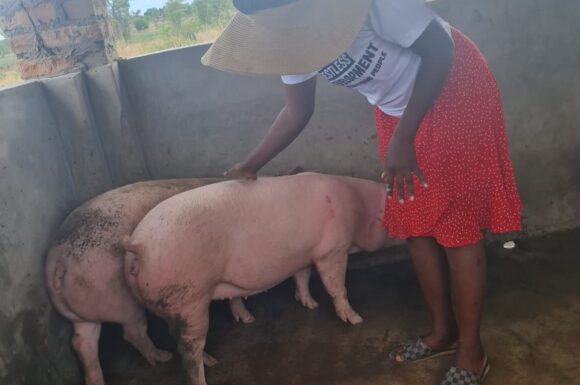Project: Agri-ELEVateD: Empowering Livelihoods through Youth Entrepreneurship Skilling and Value Chain Development
Duration: 30 MONTHS
Lead: Restless Development Zimbabwe
Geographic focus: Greater Harare (peri-urban horticulture, poultry) and Nyanga District (fruit farming, dairy)
Project Context
Zimbabwe faces one of the highest youth unemployment rates in Sub-Saharan Africa, with 54.7% of youth aged 15–34 unemployed despite high literacy rates (94% in Greater Harare; 85% in Nyanga) (Zimbabwe National Statistics Agency, 2023). Agriculture, which contributes 17% of GDP, offers significant potential for the livelihoods of youth and women, particularly in horticulture, poultry farming, fruit farming, and dairy production. Yet, barriers such as limited skills, finance, and mechanisation persist.
Restless Development Zimbabwe has received support from the Oak Foundation to implement the Agri-ELEVateD project, targeting 800 youth (60% young women) across 15 underserved communities in Greater Harare and Nyanga. The project’s first six months prioritise youth-led research and stakeholder mapping to generate actionable insights that will inform enterprise training, mobile service delivery, and value chain linkages.

Project Purpose
To equip youth and women with skills and resources to establish and strengthen viable enterprises in high-potential agricultural and agri-allied value chains.
Activities
1. Youth-led Research and Stakeholder Mapping: A foundational activity in the first six months of the project in the first six months of the project will be youth-led research aimed at identifying detailed opportunities in the local agricultural value chains and mapping of their ecosystems and key stakeholders. The research will focus on identifying critical gaps and opportunities in horticulture, poultry farming, fruit farming, and dairy production.
2. Mobile Agricultural Excellence Caravan: Restless Development Zimbabwe will introduce a Mobile Agricultural Excellence Caravan, which will serve as a hub for information, skills training, mentorship, and market access. Based on the insights generated from the youth-led research, the mobile unit will supply a tailored, contextually relevant range of information, skilling resources, and ecosystem services
3. Enterprise Development Model: Restless Development will adopt an enterprise development model that bridges the needs and potential of local youth and women with the relevant opportunities in the market ecosystem of agricultural and agri-allied value chains in the Greater Harare and Nyanga Districts. Participants will be selected through an approach that identifies individuals based on their interest, skills, and entrepreneurial potential. Youth and women will be supported to establish enterprises that address identified gaps in the value chains, such as agro-processing in Nyanga and urban horticulture in Greater Harare
4. Livelihoods Skilling and Enterprise Training: The project will leverage the high education rates in both districts by introducing business literacy and agriculture skilling programs, informed by needs assessments conducted during youth-led research. This tailored training package will cover business management, financial literacy, market access, and green entrepreneurship, as well as specific training in the various agri-business value chains, including sustainable and climate-smart agricultural practices, for participants to effectively establish, manage and grow their enterprises.
5. Market Linkages via Youth-led Cooperatives: The project will establish and strengthen youth-led cooperatives to facilitate collective action and increase bargaining and decision-making power with market systems. Youth and women will receive:
1) mentorship from established local entrepreneurs and agricultural experts.
2) access to financial services by establishing an Income Savings and Loans Association to link participants with tailored youth- and women-friendly financial products, micro finance institutions, and savings groups to improve access to capital.
3) awareness raising and forward linkages of relevant technologies such as small-scale mechanisation and solar-powered systems, which are critical for increasing productivity and reliability of production.
6. Digital Platforms and Climate Resilience: The project will integrate digital tools and platforms to enhance communication, productivity, and market access. A digital platform will be leveraged to allow for:
1) online and offline access for users in areas with limited internet connectivity, providing market prices, weather forecasts, and agricultural tips.
2) climate-smart agricultural practices, helping farmers in Nyanga and Harare adapt to changing weather patterns.
Expected Results
- Increased knowledge: At least 70% of youth and women report having increased knowledge of livelihood ecosystems and market access for young entrepreneurs.
- Enhanced skills: At least 80% of youth and women report having improved skills in business, finance, and agriculture to establish viable enterprises, resulting in improved incomes and livelihoods.
- Improved livelihoods: At least 80 existing and new viable enterprises are supported and strengthened, resulting in improved incomes and livelihoods.
- Sustainable partnerships: At least 10 youth-led cooperatives will be established or strengthened to foster sustainable partnerships with market ecosystem stakeholders and service providers.
- Established model for scale: Youth-led research and monitoring produces a strong evidence base on skilling-led interventions on youth enterprise to scale across other sectors and districts in Zimbabwe.
Expected Impact
The project will improve the livelihoods and productivity of 800 young people (at least 60% young women) across 15 communities in Greater Harare and Nyanga Districts by equipping them with relevant skills and training to establish viable enterprises within the agricultural and agri-allied value chains. The initiative will bridge the gap between youth and women entrepreneurs and agricultural opportunities through tailored support, training, access to resources, and market linkages.
